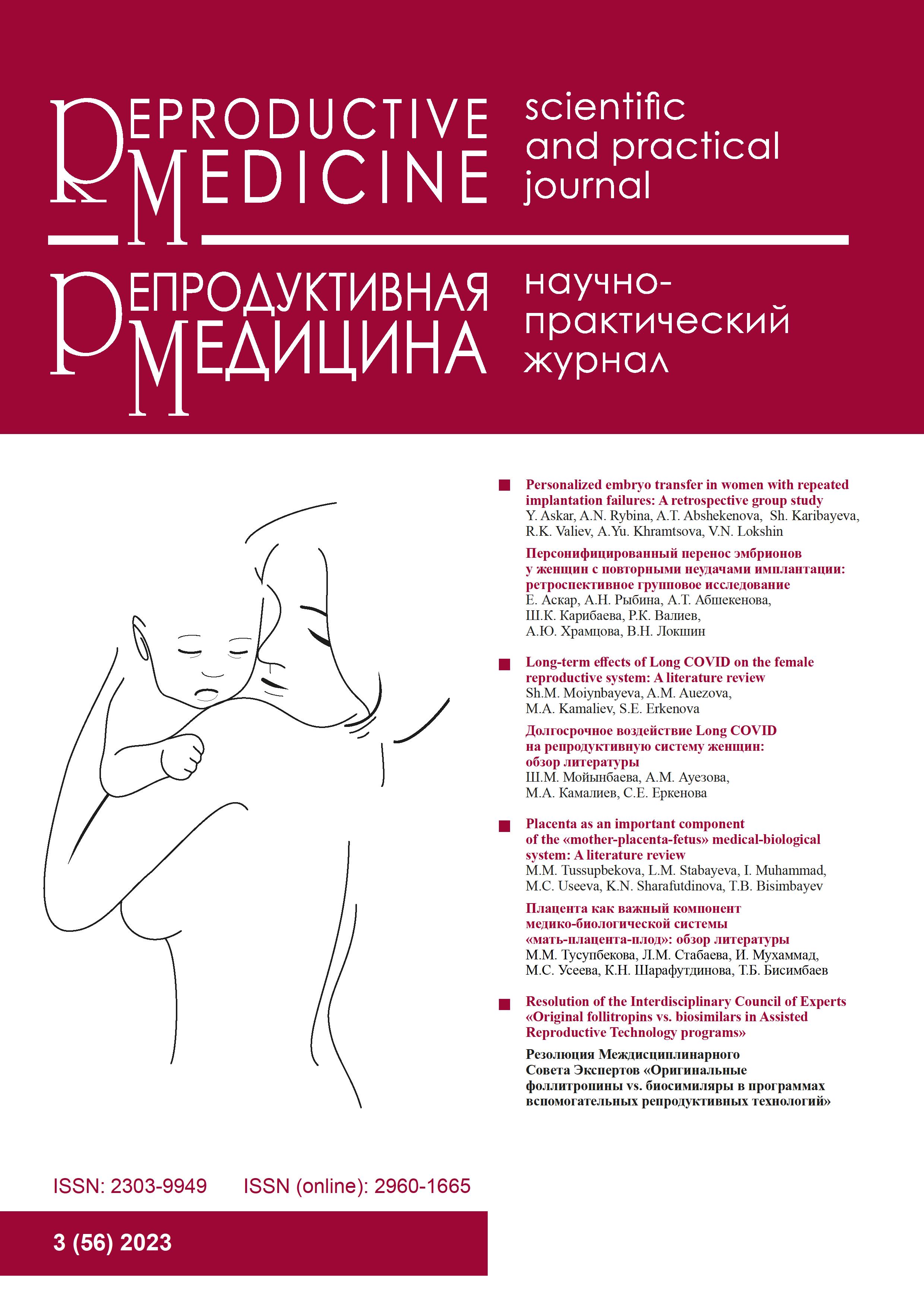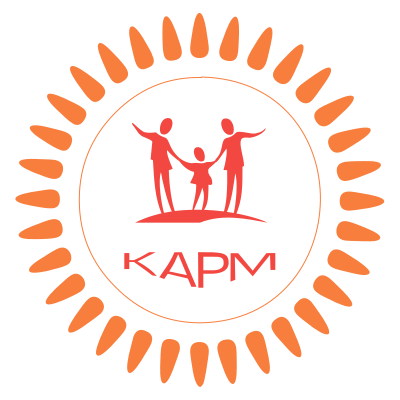Pharmacoeconomic aspects of replacement of original follitropin alfa with biosimilars in Assisted Reproductive Technologies
DOI:
https://doi.org/10.37800/RM.3.2023.86-90Keywords:
in vitro fertilization (IVF), recombinant human follicle-stimulating hormone (r-hFSH), biosimilars of recombinant human follicle-stimulating hormone, economic efficiencyAbstract
Relevance: Assisted reproductive technology (ART) has recently provided great opportunities that medicine did not have before. In vitro fertilization (IVF) is the most effective way to overcome infertility, which helps to become parents in the most difficult cases. One of the main stages of IVF is controlled ovarian stimulation (COS) of the ovaries, carried out with follitropin biological preparations - the original recombinant human follicle-stimulating hormone (r-hFSH) and its biosimilars. The safety, clinical, and economic efficiency of the original follitropin and its biosimilars are studied in comparative clinical and pharmacoeconomic studies. This review contains generalized data on the cost-effectiveness of the original drug follitropin alfa in European countries and does not compare data on clinical efficiency.
The study aimed to analyze the economic efficiency of using the original recombinant follitropin alfa and its biosimilars in assisted reproductive technology based on the results of pharmacoeconomic studies in the European market.
Materials and Methods: Clinical and economic efficiency publications were searched in the MEDLINE/PubMed databases, http://www.clinicaltrials.gov. The PubMed, MEDLINE, and clinicaltrials.gov databases were searched for evidence using the keywords “in vitro fertilization,” “recombinant human follicle stimulating hormone (r-hFSH),” “r-hFSH biosimilars,” and “economic efficiency.” As a result, publications with the main research results in IVF were selected for inclusion in the review of the evaluation of the cost-effectiveness of the original follitropin when using assisted reproductive technology.
Results: Post-marketing pharmacoeconomic studies conducted in European countries revealed the advantages of the original follitropin alfa drug (r-hFSH) over its biosimilars in terms of efficiency in achieving endpoints, in terms of better cost-effectiveness, which is evidence of the clinical and economic efficiency of using the original follitropin alfa drug rather than its biosimilars.
Conclusion: The original drug follitropin alfa has pharmacoeconomic advantages over its biosimilars in the settings of healthcare systems in European countries.
References
Lunenfeld B., Bilger W., Longobardi S., Alam V., D'Hooghe T., Sunkara S.K. The development of gonadotropins for clinical use in the treatment of infertility // Front. Endocrinol. – 2019. – Vol. 10. – P. 429. https://doi.org/10.3389%2Ffendo.2019.00429
European Medicines Agency. Gonal-fGonal-f (follitropin alfa): summary of product characteristics. – 2010. – 214 p. // www.ema.europa.eu/en/documents/product-information/Gonal-fGonal-f-epar-product-information_en.pdf
Food and Drug Administration. GONAL-FGONAL-F® RFF* REDI-JECT™ (follitropin alfa): prescribing information. – 2013. – 45 p. // www.accessdata.fda.gov/drugsatfda_docs/label/2013/021684s036lbl.pdf
Velthuis E., Hubbard J., Longobardi S., D'Hooghe T. The frequency of ovarian Hyperstimulation syndrome and thromboembolism with originator recombinant human Follitropin Alfa (Gonal-fGonal-f) for medically assisted reproduction: a systematic review // Adv. Ther. – 2020. – Vol. 37. – P. 4831-4847. https://doi.org/10.1007%2Fs12325-020-01512-w
Al-Inany H.G., Abou-Setta A.M., Aboulghar M.A., Mansour R.T., Serour G.I. Efficacy and safety of human menopausal gonadotrophins versus recombinant FSH: a meta-analysis // Reprod. BioMed. Online. – 2008. – Vol. 16. – P. 81-88. https://doi.org/10.1016/S1472-6483(10)60559-7
Coomarasamy A., Afnan M., Cheema D., van der Veen F., Bossuyt P.M., van Wely M. Urinary hMG versus recombinant FSH for controlled ovarian hyperstimulation following an agonist long down-regulation protocol in IVF or ICSI treatment: a systematic review and meta-analysis // Hum. Reprod. – 2008. – Vol. 23. – P. 310-315. https://doi.org/10.1093/humrep/dem305
European Medicines Agency; Committee for Medicinal Products for Human Use (CHMP). Guideline on similar biological medicinal products containing biotechnology-derived proteins as active substance: non-clinical and clinical issues; publ. 18.12.14, EMEA/CHMP/BMWP/42832/2005 Rev1. – 13 p. https://www.ema.europa.eu/en/documents/scientific-guideline/guideline-similar-biological-medicinal-products-containing-biotechnology-derived-proteins-active_en-2.pdf
Orvieto R., Seifer D.B. Biosimilar FSH preparations – are they identical twins or just siblings? // Reprod. Biol. Endocrinol. – 2016. – Vol. 14. – P. 32. https://doi.org/10.1186/s12958-016-0167-8
Braam S.C., de Bruin J.P., Buisman E., Brandes M., Nelen W., Smeenk J.M.J., van der Steeg J.W., Mol B.W.J., Hamilton C. Treatment strategies and cumulative live birth rates in WHO-II ovulation disorders // Eur. J. Obstet. Gynecol. Reprod. Biol. – 2018. – Vol. 225. – P. 84-89. https://doi.org/10.1016/j.ejogrb.2018.04.006
Mol B.W., Bossuyt P.M., Sunkara S.K., Garcia Velasco J.A., Venetis C., Sakkas D., Lundin K., Simón C., Taylor H.S., Wan R., Longobardi S., Cottell E., D'Hooghe T. Personalized ovarian stimulation for assisted reproductive technology: study design considerations to move from hype to added value for patients // Fertil. Steril. – 2018. – Vol. 109. – P. 968-979. https://doi.org/10.1016/j.fertnstert.2018.04.037
Braakhekke M., Kamphuis E.I., van Rumste M.M., Mol F., van der Veen F., Mol B.W. How are neonatal and maternal outcomes reported in randomized controlled trials (RCTs) in reproductive medicine? // Hum. Reprod. – 2014. – Vol. 29. – P. 1211-1217. https://doi.org/10.1093/humrep/deu069
Harbin Consensus Conference Workshop Group, Conference Chairs: Legro R.S., Wu X., Scientific Committee: Barnhart K.T., Farquhar C., Fauser B.C., Mol B. Improving the reporting of clinical trials of infertility treatments (IMPRINT): modifying the CONSORT statement†‡ // Hum. Reprod. – 2014. – Vol. 29(10). – P. 2075-2082. https://doi.org/10.1093/humrep/deu218
Šprem Goldštajn M., Mikuš M., Ćorić M., Orešković S., Dumančić S., Noventa M., Buzzaccarini G., Andrisani A., Laganà A.S. The pharmacoeconomic impact of follitropin alpha biosimilars in IVF therapy in Europe: a report of the literature // Exp. Rev. Pharmacoecon. Outcomes Res. – 2021. – Vol. 21(4). – P. 553-558. https://doi.org/10.1080/14737167.2021.1910026
Gizzo S., Ferrando M., Lispi M., Ripellino C., Cataldo N., Bühler K. A cost-effectiveness modeling evaluation comparing a biosimilar follitropin alfa preparation with its reference product for live birth outcome in Germany, Italy and Spain // J. Med. Econ. – 2018. – Vol. 21(11). – P. 1096-1101. https://doi.org/10.1080/13696998.2018.1511567
Rettenbacher M., Andersen A.N., Garcia-Velasco J.A., Sator M., Barri P., Lindenberg S., van der Ven K., Khalaf Y., Bentin-Ley U., Obruca A., Tews G., Schenk M., Strowitzki T., Narvekar N., Sator K., Imthurn B. A multi-centre phase 3 study comparing efficacy and safety of Bemfola(®) versus Gonal-fGonal-f(®) in women undergoing ovarian stimulation for IVF // Reprod. Biomed. Online. – 2015. – Vol. 30(5). – P. 504-513. https://doi.org/10.1016/j.rbmo.2015.01.005
Gizzo S., Garcia-Velasco G.A., Heiman F., Ripellino C., Bühler K. A cost-effectiveness evaluation comparing originator follitropin alfa to the biosimilar for the treatment of infertility // Int. J. Womens Health. – 2016. – Vol. 8. – P. 683-689. https://doi.org/10.2147/IJWH.S118687
Grynberg M., Murphy C., Doré C., Fresneau L., Paillet S., Petrica N., Frédérique M., Ravonimbola H. A cost-effectiveness analysis comparing the originator follitropin alfa to its biosimilars in patients undergoing a medically assisted reproduction program from a French perspective // J. Med. Econ. – 2019. – Vol. 22, Issue 1. – P. 108-115. https://doi.org/10.1080/13696998.2018.1551226
Xue W., Lloyd A., Falla E., Roeder C., Papsch R., Bühler K. A cost-effectiveness evaluation of the originator follitropin alpha compared to the biosimilars for assisted reproduction in Germany // Int. J. Womens Health. – 2019. – Vol. 11. – P. 319-331. https://doi.org/10.2147/IJWH.S193048
Schwarze J.E., Venetis C., Iniesta S., Falla E., Lukyanov V., de Agustin Calvo E., D’Hooghe T., Roeder C., Matorras R. Originator recombinant human follitropin alfa versus recombinant human follitropin alfa biosimilars in Spain: A cost-effectiveness analysis of assisted reproductive technology related to fresh embryo transfers // Best Pract. Res. Clin. Obstet. Gynaecol. – 2022. – Vol. 85(Pt B). – P. 203-216. https://doi.org/10.1016/j.bpobgyn.2022.01.011
Venetis C.A., Helwig C., Mol B.W., Chua S.J., Longobardi S., Orvieto R., Lispi M., Storr A., D'Hooghe T. Correction: Biosimilar recombinant follitropin alfa preparations versus the reference product (Gonal-F®) in couples undergoing assisted reproductive technology treatment: a systematic review and meta-analysis // Reprod. Biol. Endocrinol. – 2023. – Vol. 21(1). – P. 68. https://doi.org/10.1186/s12958-023-01114-5. Erratum for: Reprod. Biol. Endocrinol. – 2021. – Vol. 19(1). – P. 51.
Downloads
Published
How to Cite
Issue
Section
License
Copyright (c) 2023 Reproductive Medicine

This work is licensed under a Creative Commons Attribution-NonCommercial-NoDerivatives 4.0 International License.
The articles published in this Journal are licensed under the CC BY-NC-ND 4.0 (Creative Commons Attribution – Non-Commercial – No Derivatives 4.0 International) license, which provides for their non-commercial use only. Under this license, users have the right to copy and distribute the material in copyright but are not permitted to modify or use it for commercial purposes. Full details on the licensing are available at https://creativecommons.org/licenses/by-nc-nd/4.0/.





